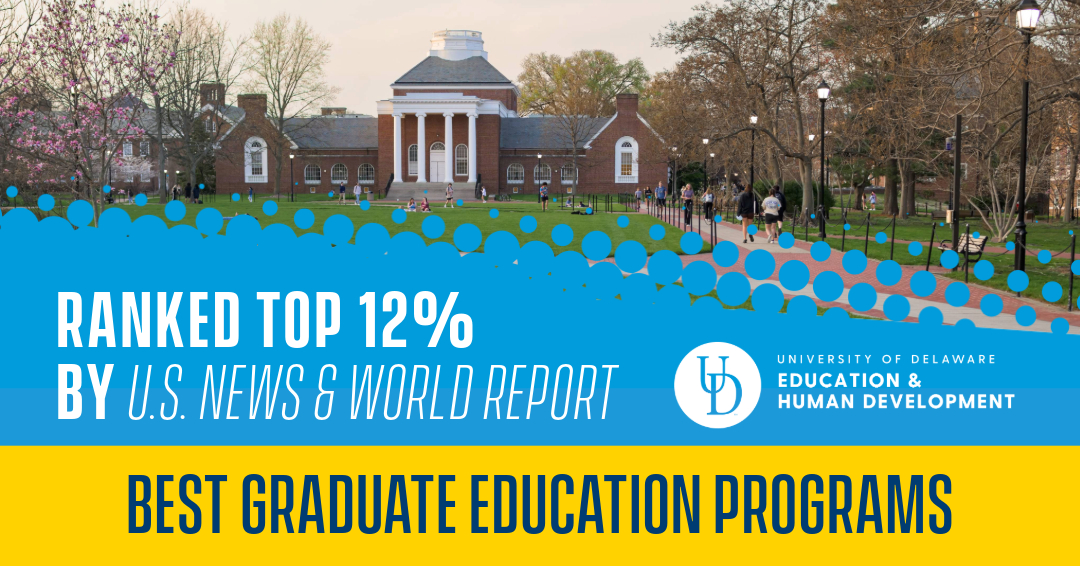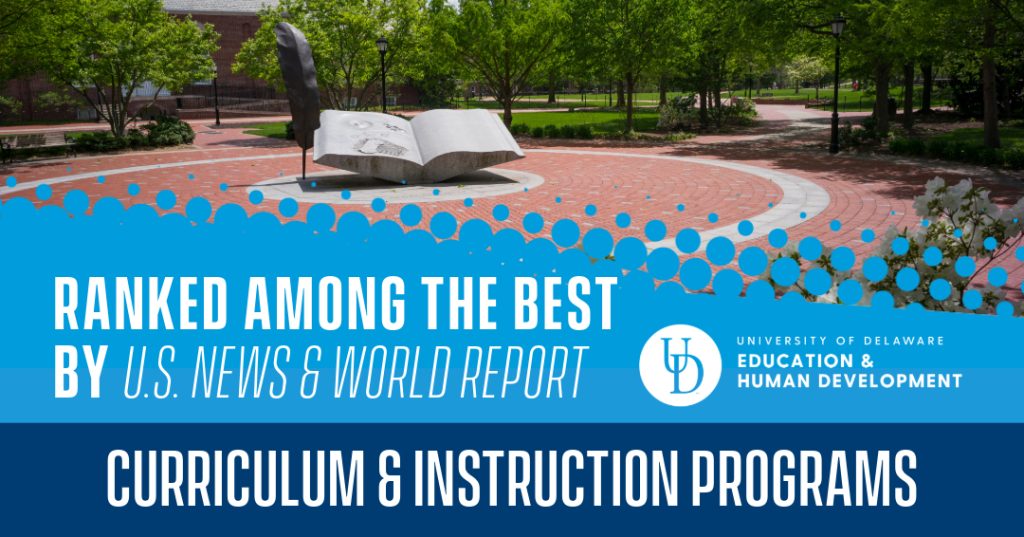CEHD Graduate Programs Rank in Top 12% in the Nation

U.S. News and World Report identifies education graduate programs among best in nation
U.S. News and World Report’s 2025-2026 rankings have placed the education graduate programs in University of Delaware’s College of Education and Human Development (CEHD) within the top 12% of all education programs across the nation. Housed within CEHD’s School of Education (SOE), the education graduate programs are now ranked 31st among 258 programs, up four places from last year.
For the first time this year, the education graduate programs were also ranked among the best curriculum and instruction programs in the country, placing 30th among 35 ranked programs. Students in a curriculum and instruction program learn how to enhance K-12 teaching strategies and build creativity in the classroom, among other skills.

“I’m glad that U.S. News and World Report continues to recognize the excellence of our CEHD graduate programs in education,” said Rena Hallam, interim dean of CEHD and professor in the Department of Human Development and Family Sciences. “Our programs help students address critical issues in teaching and learning, literacy, mathematics, school psychology and more through innovative coursework and supportive mentorship. Many of our graduate students work alongside faculty as they pursue grant-funded research projects or collaborate with teachers and practitioners in our Delaware schools.”
U.S. News and World Report evaluated CEHD on its research activity, the academic excellence of their entering students, their faculty resources and opinions on program quality from education school deans and school hiring professionals.
Research-driven programs
The SOE offers a broad portfolio of competitive, research-driven graduate programs, including a Ph.D. in education with five specialization areas, a Ph.D. in educational statistics and research methods (ESRM), an Ed.D. in educational leadership, and several master’s or specialist programs in educational technology, literacy, special education, school psychology and teacher leadership. CEHD faculty also teach within the interdisciplinary Ph.D. in education and social policy program and M.S. in interdisciplinary evaluation science, housed within UD’s Graduate College.
Informed by research and grounded in rigorous methodological approaches, CEHD’s graduate programs in education are designed and primarily taught by nationally-known, award-winning faculty in the SOE. Students develop content knowledge and advanced skills through coursework, thought-provoking symposia and immersive practicum experiences.
Outside of the classroom, many students also have an opportunity to work closely with faculty on educational research. In 2024, CEHD faculty garnered more than $29 million in funded research projects, many of which supported graduate student assistantships.
For example, Rachel Fidel, a Ph.D. in education and social Policy student, and Daniel Osgood, a Ph.D. in ESRM student, are working with a team of CEHD faculty and staff to improve K-3 literacy outcomes in Delaware. With support from the William T. Grant Foundation and other organizations, CEHD’s Partnership for Public Education and Collaborative for Data Driven Action are partnering with the Delaware Department of Education to better understand and support the early literacy needs of elementary students throughout the state.
Supportive faculty
Across graduate programs, students consistently highlight CEHD’s supportive faculty members and staff. Committed to the development of their graduate students, CEHD faculty offer mentorship and guidance as students prepare to become educators, researchers and leaders in their fields.
Michael Valenti, science department chair and science instructor at the Charter School of Wilmington, shared his experience working with SOE Professor Zoubeida Dagher as a doctoral student.
“Zoubeida has been one of the most supportive and insightful mentors in my journey as a science educator,” Valenti said. “Her kindness, empathy and deep knowledge of science education and curriculum development not only helped me grow as a researcher, but also shaped how I approach teaching. Our shared passion for science education and meaningful curriculum design made her guidance especially impactful, and I truly could not have completed my doctoral work in the educational leadership program without her.”
Recognizing the integral role that faculty play in the professional development of graduate students, CEHD hired nine new faculty members in 2024. Many of these new faculty members teach and advise within CEHD graduate programs and those housed in UD’s Graduate College.
For more information about the U.S. News and World Report rankings and other ranked UD graduate programs, visit UD’s Institutional Research and Effectiveness Rankings webpage.
Article by Jessica Henderson. Graphics by Shelly Silva.



